Analysis of Fodare Pty Ltd v Shearn: Corporate Law Case Study
VerifiedAdded on 2021/06/14
|13
|2904
|304
Report
AI Summary
This report provides a detailed analysis of the case Fodare Pty Ltd v Shearn (2011) NSWSC 479, focusing on the breach of director's duties under the Corporations Act 2001 (Cth). The case involves Ms. Shearn, a director of Fodare Pty Ltd, who misused company funds from the sale of a property for personal gain. The report examines the issues, including the violation of sections 180(1), 181(1), 182(1), and 286 of the Corporations Act, which pertain to the duty of care, good faith, proper use of position, and record-keeping. The report also discusses the court's decision, which held Ms. Shearn liable for compensation and costs, and the broader impact of the decision on the operation of companies in Australia. The analysis covers the applicability of the law, the rules governing director’s responsibilities, and the fiduciary nature of the relationship between directors and corporations, emphasizing the importance of acting in the best interests of the company. The case highlights the consequences of breaching corporate law and the need for directors to act responsibly and ethically.
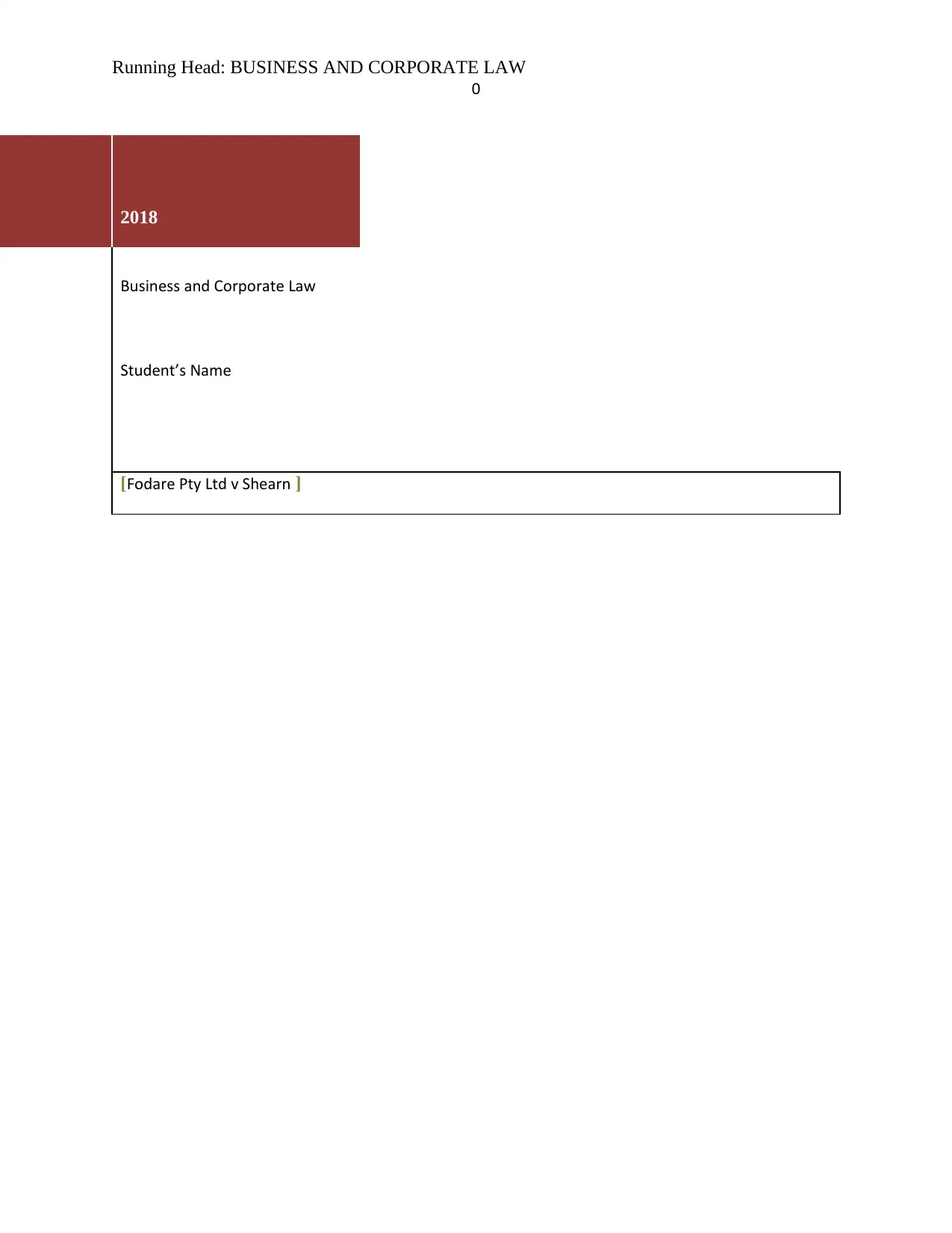
Running Head: BUSINESS AND CORPORATE LAW
0
[Fodare Pty Ltd v Shearn ]
2018
Business and Corporate Law
Student’s Name
0
[Fodare Pty Ltd v Shearn ]
2018
Business and Corporate Law
Student’s Name
Paraphrase This Document
Need a fresh take? Get an instant paraphrase of this document with our AI Paraphraser
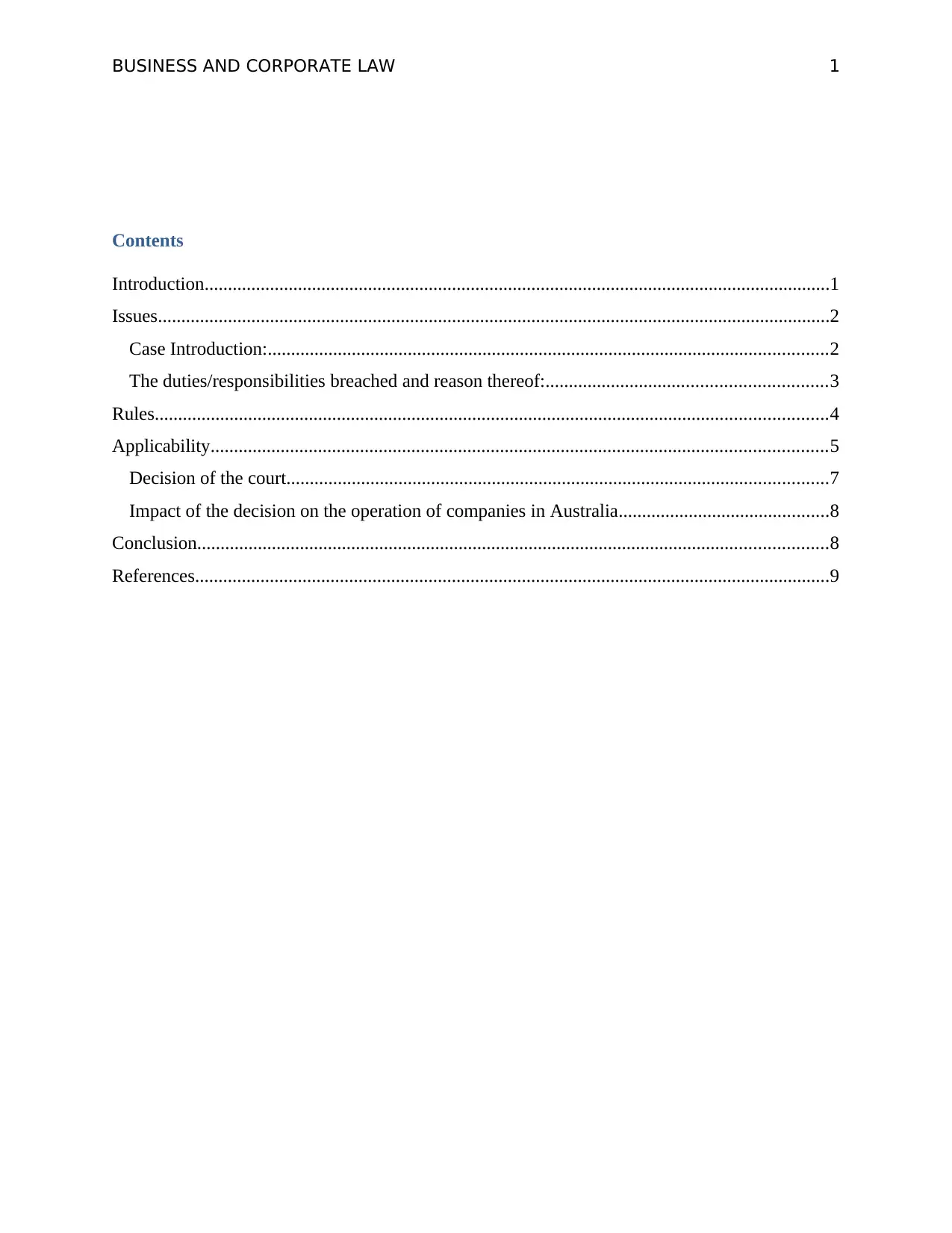
BUSINESS AND CORPORATE LAW 1
Contents
Introduction......................................................................................................................................1
Issues................................................................................................................................................2
Case Introduction:........................................................................................................................2
The duties/responsibilities breached and reason thereof:............................................................3
Rules................................................................................................................................................4
Applicability....................................................................................................................................5
Decision of the court....................................................................................................................7
Impact of the decision on the operation of companies in Australia.............................................8
Conclusion.......................................................................................................................................8
References........................................................................................................................................9
Contents
Introduction......................................................................................................................................1
Issues................................................................................................................................................2
Case Introduction:........................................................................................................................2
The duties/responsibilities breached and reason thereof:............................................................3
Rules................................................................................................................................................4
Applicability....................................................................................................................................5
Decision of the court....................................................................................................................7
Impact of the decision on the operation of companies in Australia.............................................8
Conclusion.......................................................................................................................................8
References........................................................................................................................................9
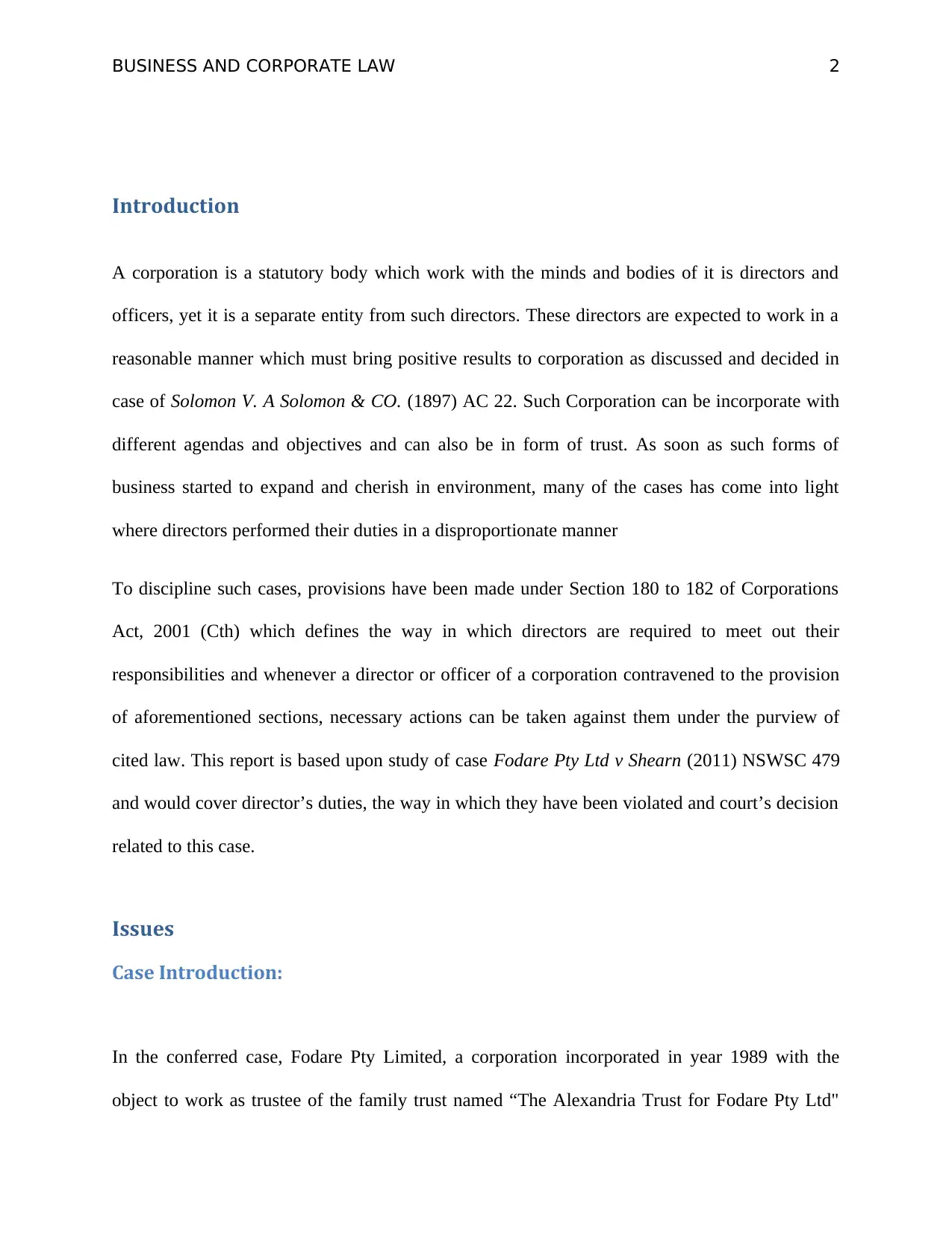
BUSINESS AND CORPORATE LAW 2
Introduction
A corporation is a statutory body which work with the minds and bodies of it is directors and
officers, yet it is a separate entity from such directors. These directors are expected to work in a
reasonable manner which must bring positive results to corporation as discussed and decided in
case of Solomon V. A Solomon & CO. (1897) AC 22. Such Corporation can be incorporate with
different agendas and objectives and can also be in form of trust. As soon as such forms of
business started to expand and cherish in environment, many of the cases has come into light
where directors performed their duties in a disproportionate manner
To discipline such cases, provisions have been made under Section 180 to 182 of Corporations
Act, 2001 (Cth) which defines the way in which directors are required to meet out their
responsibilities and whenever a director or officer of a corporation contravened to the provision
of aforementioned sections, necessary actions can be taken against them under the purview of
cited law. This report is based upon study of case Fodare Pty Ltd v Shearn (2011) NSWSC 479
and would cover director’s duties, the way in which they have been violated and court’s decision
related to this case.
Issues
Case Introduction:
In the conferred case, Fodare Pty Limited, a corporation incorporated in year 1989 with the
object to work as trustee of the family trust named “The Alexandria Trust for Fodare Pty Ltd"
Introduction
A corporation is a statutory body which work with the minds and bodies of it is directors and
officers, yet it is a separate entity from such directors. These directors are expected to work in a
reasonable manner which must bring positive results to corporation as discussed and decided in
case of Solomon V. A Solomon & CO. (1897) AC 22. Such Corporation can be incorporate with
different agendas and objectives and can also be in form of trust. As soon as such forms of
business started to expand and cherish in environment, many of the cases has come into light
where directors performed their duties in a disproportionate manner
To discipline such cases, provisions have been made under Section 180 to 182 of Corporations
Act, 2001 (Cth) which defines the way in which directors are required to meet out their
responsibilities and whenever a director or officer of a corporation contravened to the provision
of aforementioned sections, necessary actions can be taken against them under the purview of
cited law. This report is based upon study of case Fodare Pty Ltd v Shearn (2011) NSWSC 479
and would cover director’s duties, the way in which they have been violated and court’s decision
related to this case.
Issues
Case Introduction:
In the conferred case, Fodare Pty Limited, a corporation incorporated in year 1989 with the
object to work as trustee of the family trust named “The Alexandria Trust for Fodare Pty Ltd"
⊘ This is a preview!⊘
Do you want full access?
Subscribe today to unlock all pages.

Trusted by 1+ million students worldwide
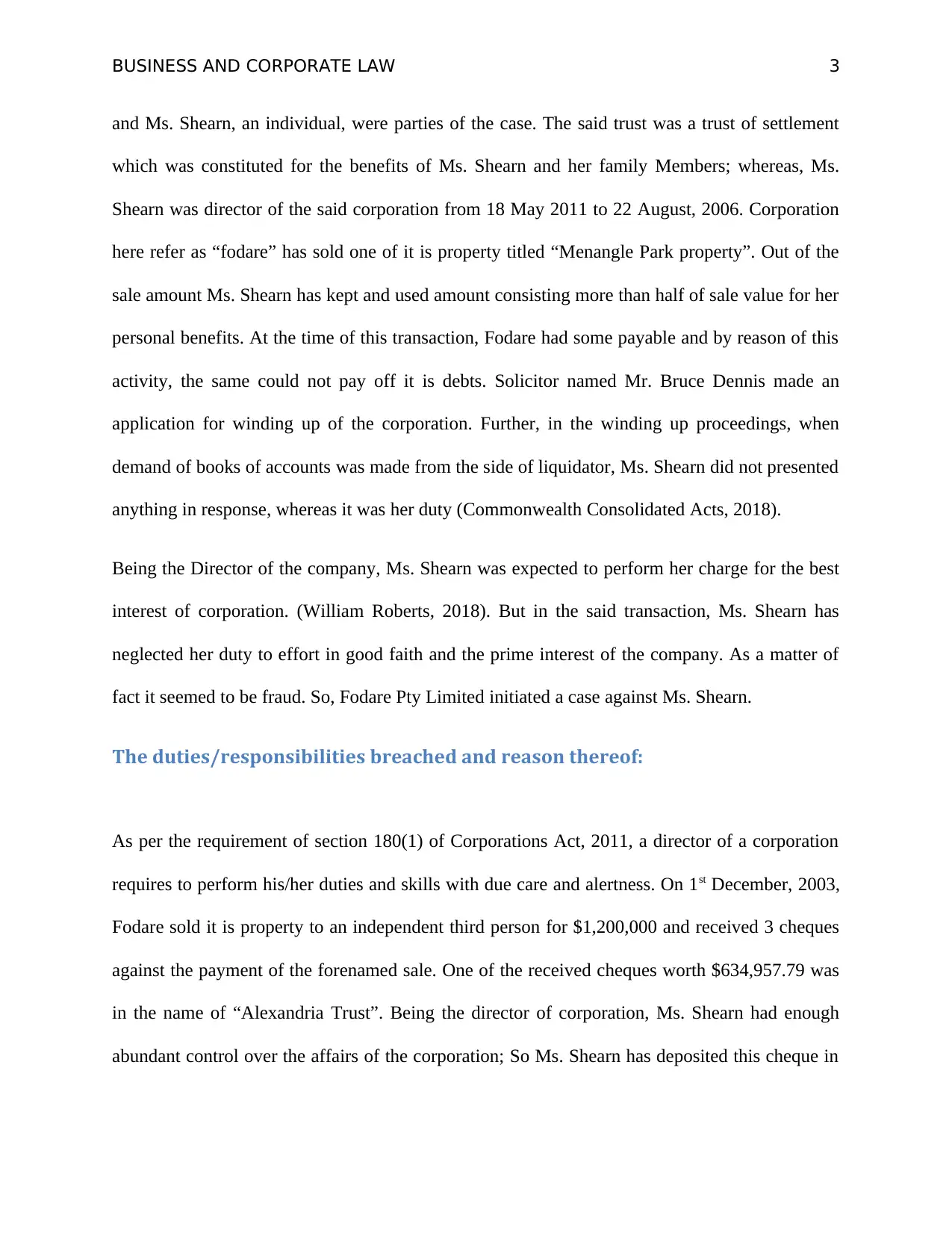
BUSINESS AND CORPORATE LAW 3
and Ms. Shearn, an individual, were parties of the case. The said trust was a trust of settlement
which was constituted for the benefits of Ms. Shearn and her family Members; whereas, Ms.
Shearn was director of the said corporation from 18 May 2011 to 22 August, 2006. Corporation
here refer as “fodare” has sold one of it is property titled “Menangle Park property”. Out of the
sale amount Ms. Shearn has kept and used amount consisting more than half of sale value for her
personal benefits. At the time of this transaction, Fodare had some payable and by reason of this
activity, the same could not pay off it is debts. Solicitor named Mr. Bruce Dennis made an
application for winding up of the corporation. Further, in the winding up proceedings, when
demand of books of accounts was made from the side of liquidator, Ms. Shearn did not presented
anything in response, whereas it was her duty (Commonwealth Consolidated Acts, 2018).
Being the Director of the company, Ms. Shearn was expected to perform her charge for the best
interest of corporation. (William Roberts, 2018). But in the said transaction, Ms. Shearn has
neglected her duty to effort in good faith and the prime interest of the company. As a matter of
fact it seemed to be fraud. So, Fodare Pty Limited initiated a case against Ms. Shearn.
The duties/responsibilities breached and reason thereof:
As per the requirement of section 180(1) of Corporations Act, 2011, a director of a corporation
requires to perform his/her duties and skills with due care and alertness. On 1st December, 2003,
Fodare sold it is property to an independent third person for $1,200,000 and received 3 cheques
against the payment of the forenamed sale. One of the received cheques worth $634,957.79 was
in the name of “Alexandria Trust”. Being the director of corporation, Ms. Shearn had enough
abundant control over the affairs of the corporation; So Ms. Shearn has deposited this cheque in
and Ms. Shearn, an individual, were parties of the case. The said trust was a trust of settlement
which was constituted for the benefits of Ms. Shearn and her family Members; whereas, Ms.
Shearn was director of the said corporation from 18 May 2011 to 22 August, 2006. Corporation
here refer as “fodare” has sold one of it is property titled “Menangle Park property”. Out of the
sale amount Ms. Shearn has kept and used amount consisting more than half of sale value for her
personal benefits. At the time of this transaction, Fodare had some payable and by reason of this
activity, the same could not pay off it is debts. Solicitor named Mr. Bruce Dennis made an
application for winding up of the corporation. Further, in the winding up proceedings, when
demand of books of accounts was made from the side of liquidator, Ms. Shearn did not presented
anything in response, whereas it was her duty (Commonwealth Consolidated Acts, 2018).
Being the Director of the company, Ms. Shearn was expected to perform her charge for the best
interest of corporation. (William Roberts, 2018). But in the said transaction, Ms. Shearn has
neglected her duty to effort in good faith and the prime interest of the company. As a matter of
fact it seemed to be fraud. So, Fodare Pty Limited initiated a case against Ms. Shearn.
The duties/responsibilities breached and reason thereof:
As per the requirement of section 180(1) of Corporations Act, 2011, a director of a corporation
requires to perform his/her duties and skills with due care and alertness. On 1st December, 2003,
Fodare sold it is property to an independent third person for $1,200,000 and received 3 cheques
against the payment of the forenamed sale. One of the received cheques worth $634,957.79 was
in the name of “Alexandria Trust”. Being the director of corporation, Ms. Shearn had enough
abundant control over the affairs of the corporation; So Ms. Shearn has deposited this cheque in
Paraphrase This Document
Need a fresh take? Get an instant paraphrase of this document with our AI Paraphraser
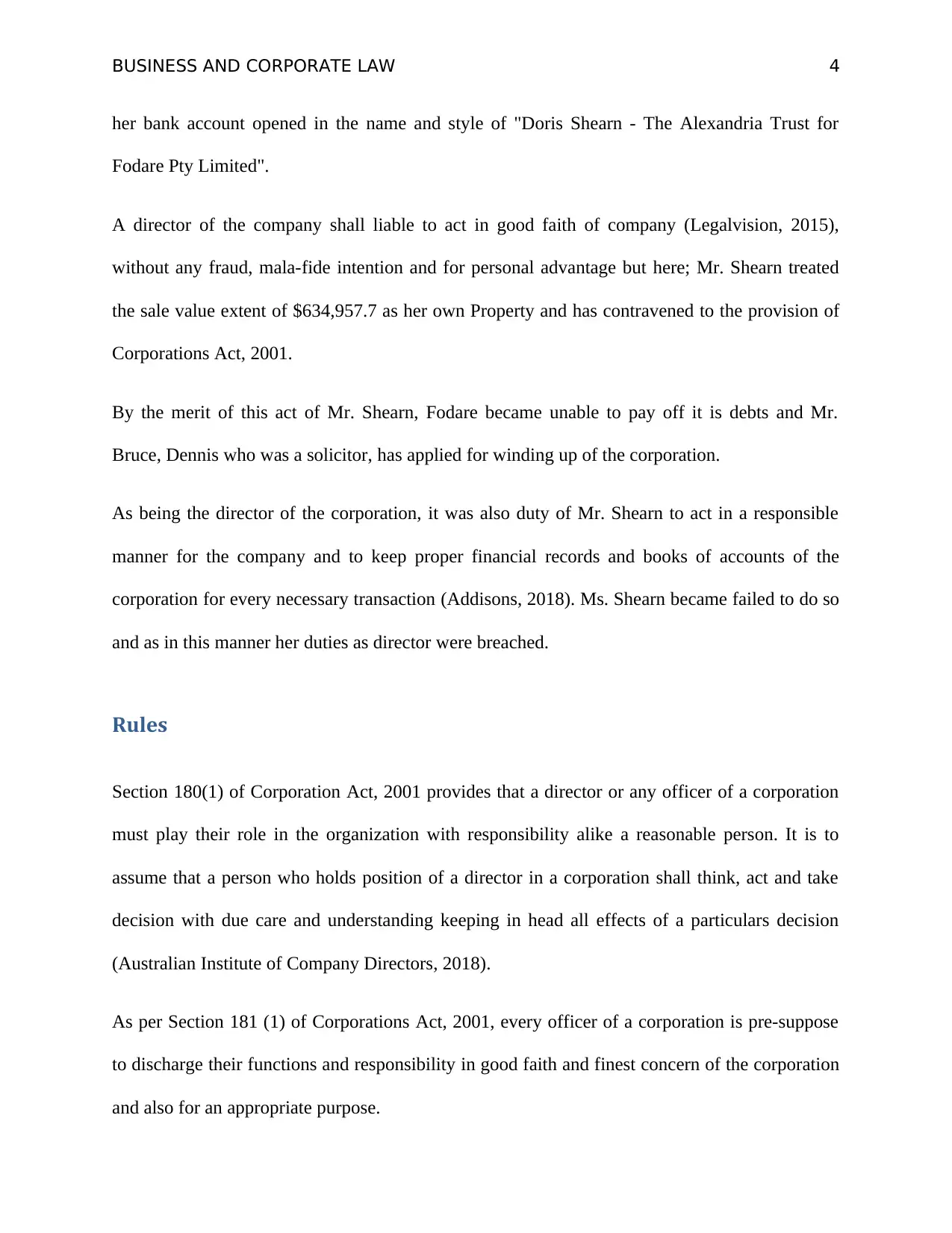
BUSINESS AND CORPORATE LAW 4
her bank account opened in the name and style of "Doris Shearn - The Alexandria Trust for
Fodare Pty Limited".
A director of the company shall liable to act in good faith of company (Legalvision, 2015),
without any fraud, mala-fide intention and for personal advantage but here; Mr. Shearn treated
the sale value extent of $634,957.7 as her own Property and has contravened to the provision of
Corporations Act, 2001.
By the merit of this act of Mr. Shearn, Fodare became unable to pay off it is debts and Mr.
Bruce, Dennis who was a solicitor, has applied for winding up of the corporation.
As being the director of the corporation, it was also duty of Mr. Shearn to act in a responsible
manner for the company and to keep proper financial records and books of accounts of the
corporation for every necessary transaction (Addisons, 2018). Ms. Shearn became failed to do so
and as in this manner her duties as director were breached.
Rules
Section 180(1) of Corporation Act, 2001 provides that a director or any officer of a corporation
must play their role in the organization with responsibility alike a reasonable person. It is to
assume that a person who holds position of a director in a corporation shall think, act and take
decision with due care and understanding keeping in head all effects of a particulars decision
(Australian Institute of Company Directors, 2018).
As per Section 181 (1) of Corporations Act, 2001, every officer of a corporation is pre-suppose
to discharge their functions and responsibility in good faith and finest concern of the corporation
and also for an appropriate purpose.
her bank account opened in the name and style of "Doris Shearn - The Alexandria Trust for
Fodare Pty Limited".
A director of the company shall liable to act in good faith of company (Legalvision, 2015),
without any fraud, mala-fide intention and for personal advantage but here; Mr. Shearn treated
the sale value extent of $634,957.7 as her own Property and has contravened to the provision of
Corporations Act, 2001.
By the merit of this act of Mr. Shearn, Fodare became unable to pay off it is debts and Mr.
Bruce, Dennis who was a solicitor, has applied for winding up of the corporation.
As being the director of the corporation, it was also duty of Mr. Shearn to act in a responsible
manner for the company and to keep proper financial records and books of accounts of the
corporation for every necessary transaction (Addisons, 2018). Ms. Shearn became failed to do so
and as in this manner her duties as director were breached.
Rules
Section 180(1) of Corporation Act, 2001 provides that a director or any officer of a corporation
must play their role in the organization with responsibility alike a reasonable person. It is to
assume that a person who holds position of a director in a corporation shall think, act and take
decision with due care and understanding keeping in head all effects of a particulars decision
(Australian Institute of Company Directors, 2018).
As per Section 181 (1) of Corporations Act, 2001, every officer of a corporation is pre-suppose
to discharge their functions and responsibility in good faith and finest concern of the corporation
and also for an appropriate purpose.
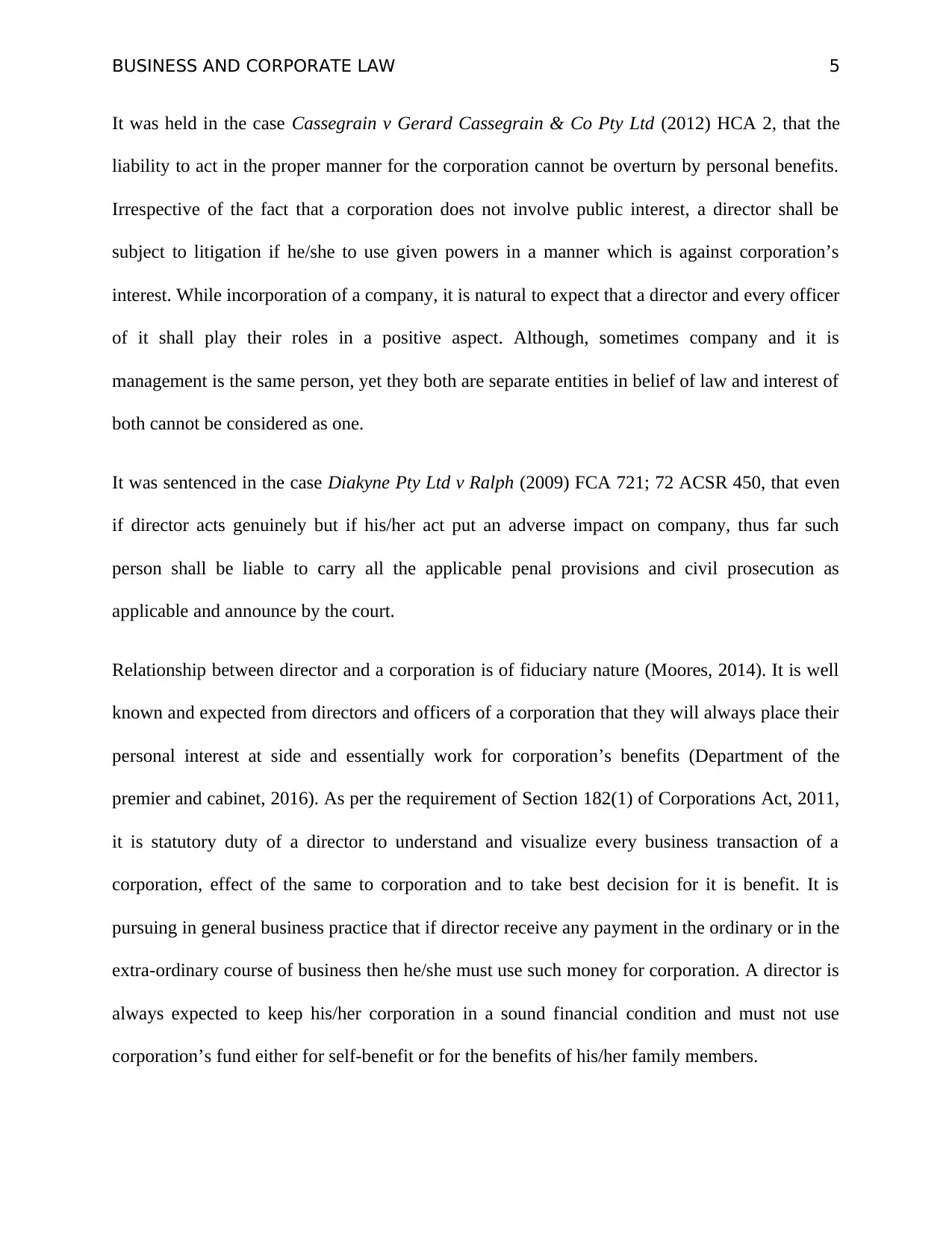
BUSINESS AND CORPORATE LAW 5
It was held in the case Cassegrain v Gerard Cassegrain & Co Pty Ltd (2012) HCA 2, that the
liability to act in the proper manner for the corporation cannot be overturn by personal benefits.
Irrespective of the fact that a corporation does not involve public interest, a director shall be
subject to litigation if he/she to use given powers in a manner which is against corporation’s
interest. While incorporation of a company, it is natural to expect that a director and every officer
of it shall play their roles in a positive aspect. Although, sometimes company and it is
management is the same person, yet they both are separate entities in belief of law and interest of
both cannot be considered as one.
It was sentenced in the case Diakyne Pty Ltd v Ralph (2009) FCA 721; 72 ACSR 450, that even
if director acts genuinely but if his/her act put an adverse impact on company, thus far such
person shall be liable to carry all the applicable penal provisions and civil prosecution as
applicable and announce by the court.
Relationship between director and a corporation is of fiduciary nature (Moores, 2014). It is well
known and expected from directors and officers of a corporation that they will always place their
personal interest at side and essentially work for corporation’s benefits (Department of the
premier and cabinet, 2016). As per the requirement of Section 182(1) of Corporations Act, 2011,
it is statutory duty of a director to understand and visualize every business transaction of a
corporation, effect of the same to corporation and to take best decision for it is benefit. It is
pursuing in general business practice that if director receive any payment in the ordinary or in the
extra-ordinary course of business then he/she must use such money for corporation. A director is
always expected to keep his/her corporation in a sound financial condition and must not use
corporation’s fund either for self-benefit or for the benefits of his/her family members.
It was held in the case Cassegrain v Gerard Cassegrain & Co Pty Ltd (2012) HCA 2, that the
liability to act in the proper manner for the corporation cannot be overturn by personal benefits.
Irrespective of the fact that a corporation does not involve public interest, a director shall be
subject to litigation if he/she to use given powers in a manner which is against corporation’s
interest. While incorporation of a company, it is natural to expect that a director and every officer
of it shall play their roles in a positive aspect. Although, sometimes company and it is
management is the same person, yet they both are separate entities in belief of law and interest of
both cannot be considered as one.
It was sentenced in the case Diakyne Pty Ltd v Ralph (2009) FCA 721; 72 ACSR 450, that even
if director acts genuinely but if his/her act put an adverse impact on company, thus far such
person shall be liable to carry all the applicable penal provisions and civil prosecution as
applicable and announce by the court.
Relationship between director and a corporation is of fiduciary nature (Moores, 2014). It is well
known and expected from directors and officers of a corporation that they will always place their
personal interest at side and essentially work for corporation’s benefits (Department of the
premier and cabinet, 2016). As per the requirement of Section 182(1) of Corporations Act, 2011,
it is statutory duty of a director to understand and visualize every business transaction of a
corporation, effect of the same to corporation and to take best decision for it is benefit. It is
pursuing in general business practice that if director receive any payment in the ordinary or in the
extra-ordinary course of business then he/she must use such money for corporation. A director is
always expected to keep his/her corporation in a sound financial condition and must not use
corporation’s fund either for self-benefit or for the benefits of his/her family members.
⊘ This is a preview!⊘
Do you want full access?
Subscribe today to unlock all pages.

Trusted by 1+ million students worldwide
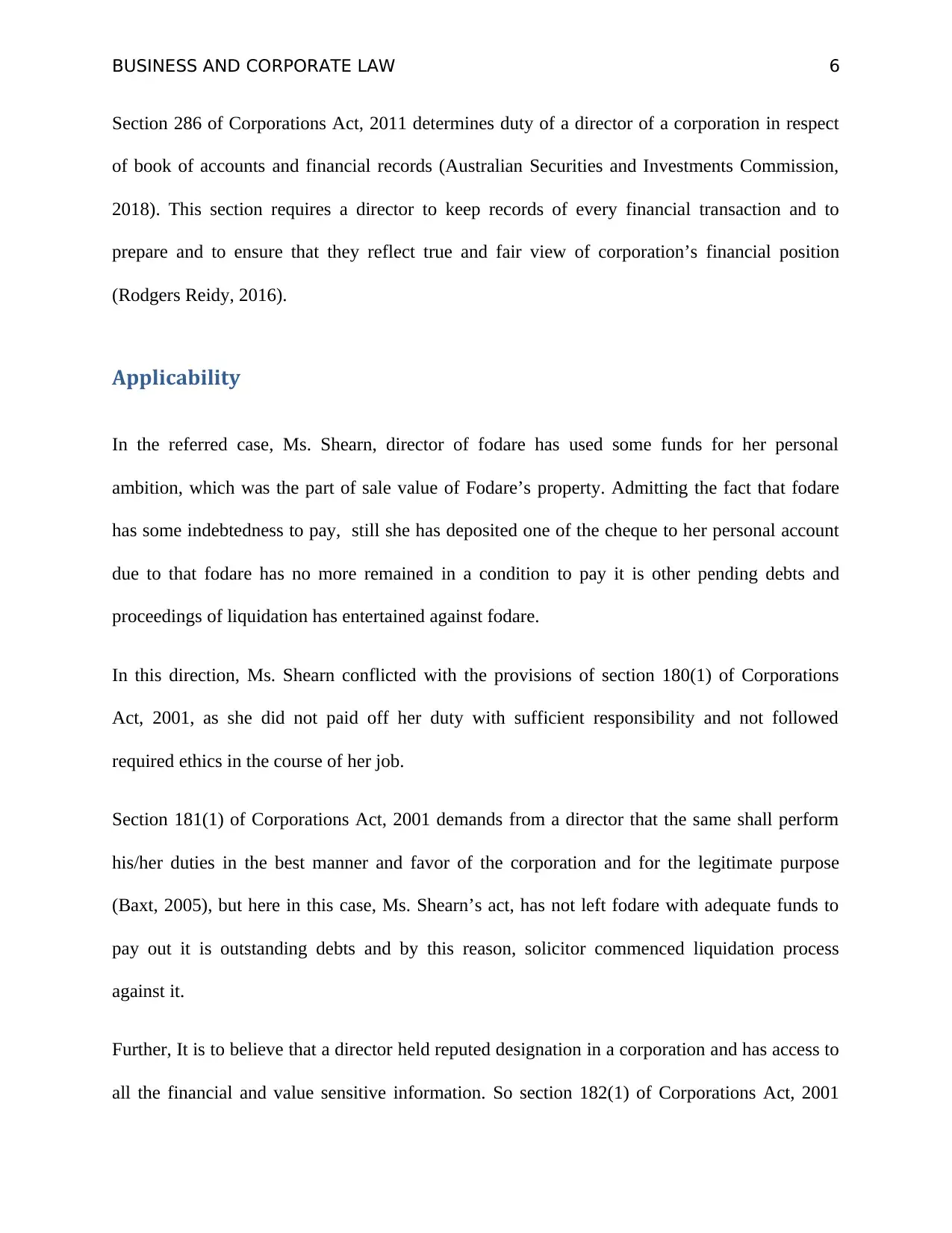
BUSINESS AND CORPORATE LAW 6
Section 286 of Corporations Act, 2011 determines duty of a director of a corporation in respect
of book of accounts and financial records (Australian Securities and Investments Commission,
2018). This section requires a director to keep records of every financial transaction and to
prepare and to ensure that they reflect true and fair view of corporation’s financial position
(Rodgers Reidy, 2016).
Applicability
In the referred case, Ms. Shearn, director of fodare has used some funds for her personal
ambition, which was the part of sale value of Fodare’s property. Admitting the fact that fodare
has some indebtedness to pay, still she has deposited one of the cheque to her personal account
due to that fodare has no more remained in a condition to pay it is other pending debts and
proceedings of liquidation has entertained against fodare.
In this direction, Ms. Shearn conflicted with the provisions of section 180(1) of Corporations
Act, 2001, as she did not paid off her duty with sufficient responsibility and not followed
required ethics in the course of her job.
Section 181(1) of Corporations Act, 2001 demands from a director that the same shall perform
his/her duties in the best manner and favor of the corporation and for the legitimate purpose
(Baxt, 2005), but here in this case, Ms. Shearn’s act, has not left fodare with adequate funds to
pay out it is outstanding debts and by this reason, solicitor commenced liquidation process
against it.
Further, It is to believe that a director held reputed designation in a corporation and has access to
all the financial and value sensitive information. So section 182(1) of Corporations Act, 2001
Section 286 of Corporations Act, 2011 determines duty of a director of a corporation in respect
of book of accounts and financial records (Australian Securities and Investments Commission,
2018). This section requires a director to keep records of every financial transaction and to
prepare and to ensure that they reflect true and fair view of corporation’s financial position
(Rodgers Reidy, 2016).
Applicability
In the referred case, Ms. Shearn, director of fodare has used some funds for her personal
ambition, which was the part of sale value of Fodare’s property. Admitting the fact that fodare
has some indebtedness to pay, still she has deposited one of the cheque to her personal account
due to that fodare has no more remained in a condition to pay it is other pending debts and
proceedings of liquidation has entertained against fodare.
In this direction, Ms. Shearn conflicted with the provisions of section 180(1) of Corporations
Act, 2001, as she did not paid off her duty with sufficient responsibility and not followed
required ethics in the course of her job.
Section 181(1) of Corporations Act, 2001 demands from a director that the same shall perform
his/her duties in the best manner and favor of the corporation and for the legitimate purpose
(Baxt, 2005), but here in this case, Ms. Shearn’s act, has not left fodare with adequate funds to
pay out it is outstanding debts and by this reason, solicitor commenced liquidation process
against it.
Further, It is to believe that a director held reputed designation in a corporation and has access to
all the financial and value sensitive information. So section 182(1) of Corporations Act, 2001
Paraphrase This Document
Need a fresh take? Get an instant paraphrase of this document with our AI Paraphraser
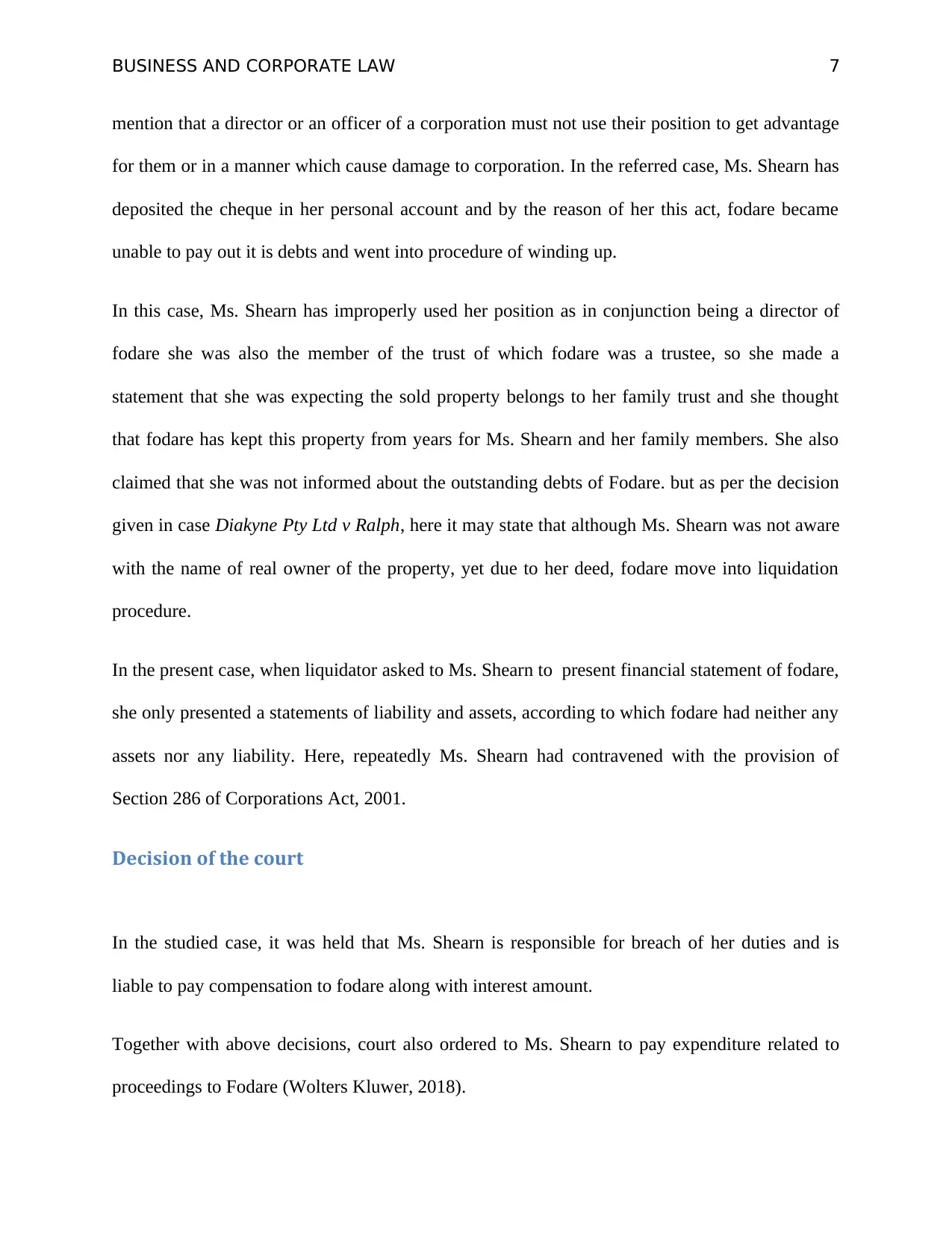
BUSINESS AND CORPORATE LAW 7
mention that a director or an officer of a corporation must not use their position to get advantage
for them or in a manner which cause damage to corporation. In the referred case, Ms. Shearn has
deposited the cheque in her personal account and by the reason of her this act, fodare became
unable to pay out it is debts and went into procedure of winding up.
In this case, Ms. Shearn has improperly used her position as in conjunction being a director of
fodare she was also the member of the trust of which fodare was a trustee, so she made a
statement that she was expecting the sold property belongs to her family trust and she thought
that fodare has kept this property from years for Ms. Shearn and her family members. She also
claimed that she was not informed about the outstanding debts of Fodare. but as per the decision
given in case Diakyne Pty Ltd v Ralph, here it may state that although Ms. Shearn was not aware
with the name of real owner of the property, yet due to her deed, fodare move into liquidation
procedure.
In the present case, when liquidator asked to Ms. Shearn to present financial statement of fodare,
she only presented a statements of liability and assets, according to which fodare had neither any
assets nor any liability. Here, repeatedly Ms. Shearn had contravened with the provision of
Section 286 of Corporations Act, 2001.
Decision of the court
In the studied case, it was held that Ms. Shearn is responsible for breach of her duties and is
liable to pay compensation to fodare along with interest amount.
Together with above decisions, court also ordered to Ms. Shearn to pay expenditure related to
proceedings to Fodare (Wolters Kluwer, 2018).
mention that a director or an officer of a corporation must not use their position to get advantage
for them or in a manner which cause damage to corporation. In the referred case, Ms. Shearn has
deposited the cheque in her personal account and by the reason of her this act, fodare became
unable to pay out it is debts and went into procedure of winding up.
In this case, Ms. Shearn has improperly used her position as in conjunction being a director of
fodare she was also the member of the trust of which fodare was a trustee, so she made a
statement that she was expecting the sold property belongs to her family trust and she thought
that fodare has kept this property from years for Ms. Shearn and her family members. She also
claimed that she was not informed about the outstanding debts of Fodare. but as per the decision
given in case Diakyne Pty Ltd v Ralph, here it may state that although Ms. Shearn was not aware
with the name of real owner of the property, yet due to her deed, fodare move into liquidation
procedure.
In the present case, when liquidator asked to Ms. Shearn to present financial statement of fodare,
she only presented a statements of liability and assets, according to which fodare had neither any
assets nor any liability. Here, repeatedly Ms. Shearn had contravened with the provision of
Section 286 of Corporations Act, 2001.
Decision of the court
In the studied case, it was held that Ms. Shearn is responsible for breach of her duties and is
liable to pay compensation to fodare along with interest amount.
Together with above decisions, court also ordered to Ms. Shearn to pay expenditure related to
proceedings to Fodare (Wolters Kluwer, 2018).
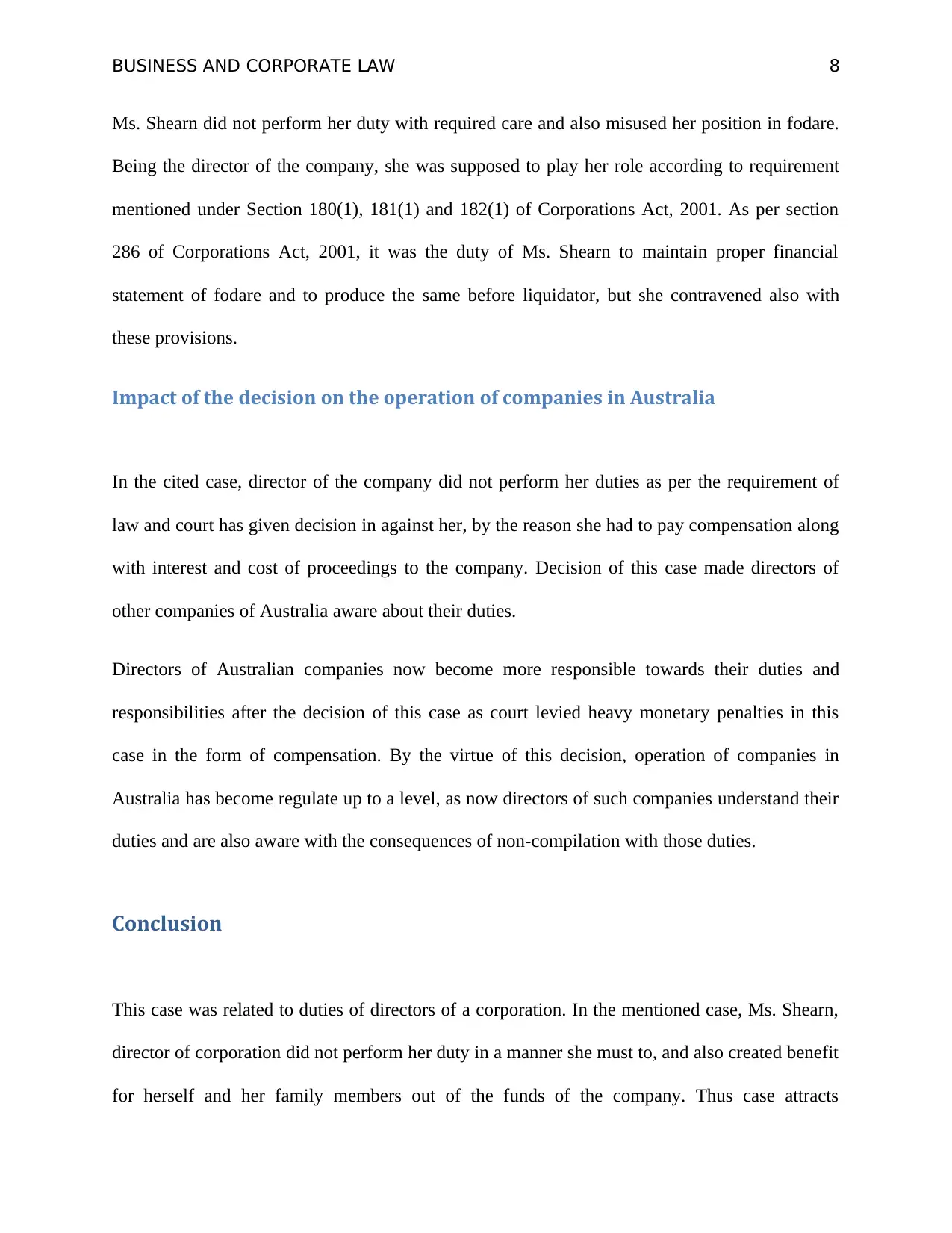
BUSINESS AND CORPORATE LAW 8
Ms. Shearn did not perform her duty with required care and also misused her position in fodare.
Being the director of the company, she was supposed to play her role according to requirement
mentioned under Section 180(1), 181(1) and 182(1) of Corporations Act, 2001. As per section
286 of Corporations Act, 2001, it was the duty of Ms. Shearn to maintain proper financial
statement of fodare and to produce the same before liquidator, but she contravened also with
these provisions.
Impact of the decision on the operation of companies in Australia
In the cited case, director of the company did not perform her duties as per the requirement of
law and court has given decision in against her, by the reason she had to pay compensation along
with interest and cost of proceedings to the company. Decision of this case made directors of
other companies of Australia aware about their duties.
Directors of Australian companies now become more responsible towards their duties and
responsibilities after the decision of this case as court levied heavy monetary penalties in this
case in the form of compensation. By the virtue of this decision, operation of companies in
Australia has become regulate up to a level, as now directors of such companies understand their
duties and are also aware with the consequences of non-compilation with those duties.
Conclusion
This case was related to duties of directors of a corporation. In the mentioned case, Ms. Shearn,
director of corporation did not perform her duty in a manner she must to, and also created benefit
for herself and her family members out of the funds of the company. Thus case attracts
Ms. Shearn did not perform her duty with required care and also misused her position in fodare.
Being the director of the company, she was supposed to play her role according to requirement
mentioned under Section 180(1), 181(1) and 182(1) of Corporations Act, 2001. As per section
286 of Corporations Act, 2001, it was the duty of Ms. Shearn to maintain proper financial
statement of fodare and to produce the same before liquidator, but she contravened also with
these provisions.
Impact of the decision on the operation of companies in Australia
In the cited case, director of the company did not perform her duties as per the requirement of
law and court has given decision in against her, by the reason she had to pay compensation along
with interest and cost of proceedings to the company. Decision of this case made directors of
other companies of Australia aware about their duties.
Directors of Australian companies now become more responsible towards their duties and
responsibilities after the decision of this case as court levied heavy monetary penalties in this
case in the form of compensation. By the virtue of this decision, operation of companies in
Australia has become regulate up to a level, as now directors of such companies understand their
duties and are also aware with the consequences of non-compilation with those duties.
Conclusion
This case was related to duties of directors of a corporation. In the mentioned case, Ms. Shearn,
director of corporation did not perform her duty in a manner she must to, and also created benefit
for herself and her family members out of the funds of the company. Thus case attracts
⊘ This is a preview!⊘
Do you want full access?
Subscribe today to unlock all pages.

Trusted by 1+ million students worldwide
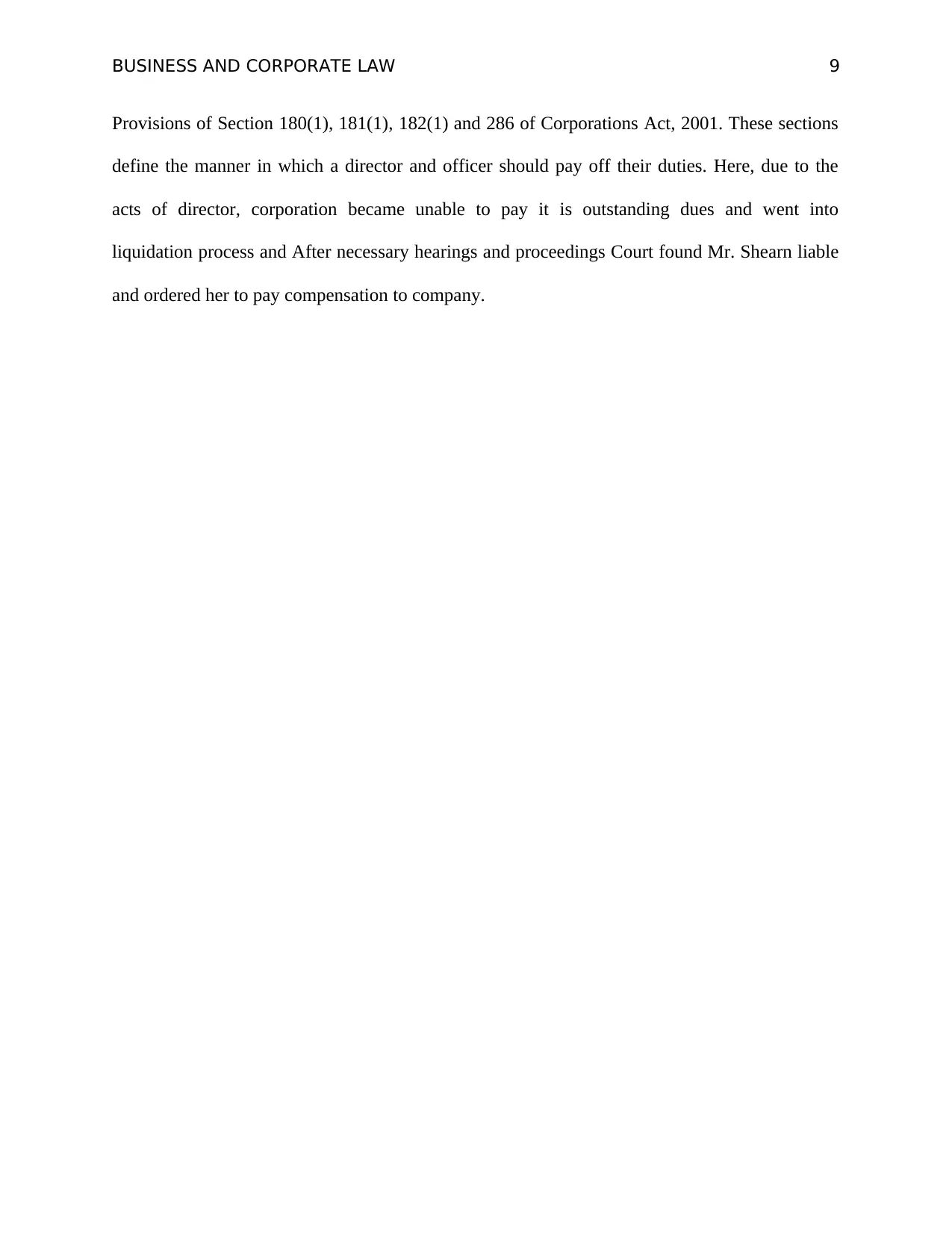
BUSINESS AND CORPORATE LAW 9
Provisions of Section 180(1), 181(1), 182(1) and 286 of Corporations Act, 2001. These sections
define the manner in which a director and officer should pay off their duties. Here, due to the
acts of director, corporation became unable to pay it is outstanding dues and went into
liquidation process and After necessary hearings and proceedings Court found Mr. Shearn liable
and ordered her to pay compensation to company.
Provisions of Section 180(1), 181(1), 182(1) and 286 of Corporations Act, 2001. These sections
define the manner in which a director and officer should pay off their duties. Here, due to the
acts of director, corporation became unable to pay it is outstanding dues and went into
liquidation process and After necessary hearings and proceedings Court found Mr. Shearn liable
and ordered her to pay compensation to company.
Paraphrase This Document
Need a fresh take? Get an instant paraphrase of this document with our AI Paraphraser
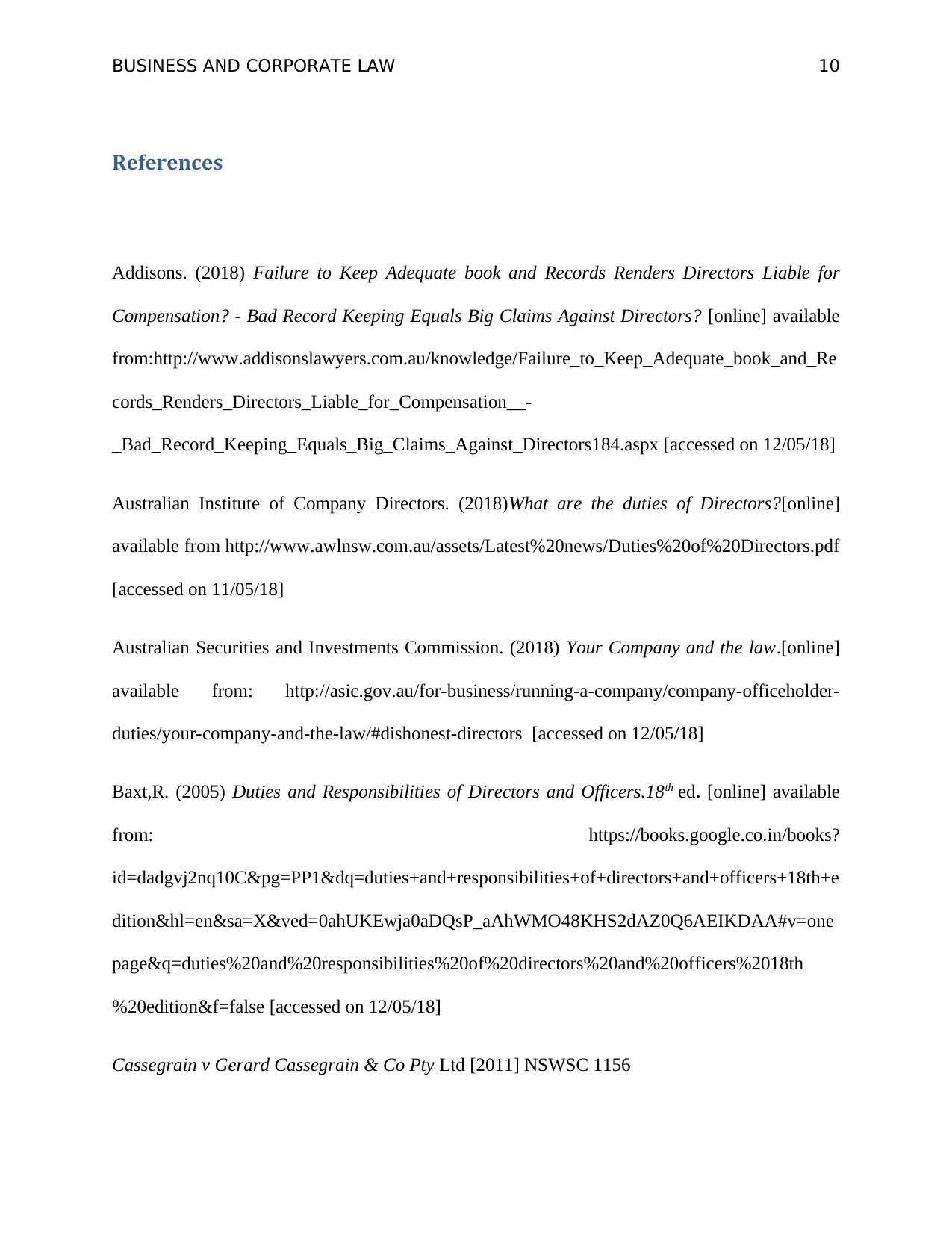
BUSINESS AND CORPORATE LAW 10
References
Addisons. (2018) Failure to Keep Adequate book and Records Renders Directors Liable for
Compensation? - Bad Record Keeping Equals Big Claims Against Directors? [online] available
from:http://www.addisonslawyers.com.au/knowledge/Failure_to_Keep_Adequate_book_and_Re
cords_Renders_Directors_Liable_for_Compensation__-
_Bad_Record_Keeping_Equals_Big_Claims_Against_Directors184.aspx [accessed on 12/05/18]
Australian Institute of Company Directors. (2018)What are the duties of Directors?[online]
available from http://www.awlnsw.com.au/assets/Latest%20news/Duties%20of%20Directors.pdf
[accessed on 11/05/18]
Australian Securities and Investments Commission. (2018) Your Company and the law.[online]
available from: http://asic.gov.au/for-business/running-a-company/company-officeholder-
duties/your-company-and-the-law/#dishonest-directors [accessed on 12/05/18]
Baxt,R. (2005) Duties and Responsibilities of Directors and Officers.18th ed. [online] available
from: https://books.google.co.in/books?
id=dadgvj2nq10C&pg=PP1&dq=duties+and+responsibilities+of+directors+and+officers+18th+e
dition&hl=en&sa=X&ved=0ahUKEwja0aDQsP_aAhWMO48KHS2dAZ0Q6AEIKDAA#v=one
page&q=duties%20and%20responsibilities%20of%20directors%20and%20officers%2018th
%20edition&f=false [accessed on 12/05/18]
Cassegrain v Gerard Cassegrain & Co Pty Ltd [2011] NSWSC 1156
References
Addisons. (2018) Failure to Keep Adequate book and Records Renders Directors Liable for
Compensation? - Bad Record Keeping Equals Big Claims Against Directors? [online] available
from:http://www.addisonslawyers.com.au/knowledge/Failure_to_Keep_Adequate_book_and_Re
cords_Renders_Directors_Liable_for_Compensation__-
_Bad_Record_Keeping_Equals_Big_Claims_Against_Directors184.aspx [accessed on 12/05/18]
Australian Institute of Company Directors. (2018)What are the duties of Directors?[online]
available from http://www.awlnsw.com.au/assets/Latest%20news/Duties%20of%20Directors.pdf
[accessed on 11/05/18]
Australian Securities and Investments Commission. (2018) Your Company and the law.[online]
available from: http://asic.gov.au/for-business/running-a-company/company-officeholder-
duties/your-company-and-the-law/#dishonest-directors [accessed on 12/05/18]
Baxt,R. (2005) Duties and Responsibilities of Directors and Officers.18th ed. [online] available
from: https://books.google.co.in/books?
id=dadgvj2nq10C&pg=PP1&dq=duties+and+responsibilities+of+directors+and+officers+18th+e
dition&hl=en&sa=X&ved=0ahUKEwja0aDQsP_aAhWMO48KHS2dAZ0Q6AEIKDAA#v=one
page&q=duties%20and%20responsibilities%20of%20directors%20and%20officers%2018th
%20edition&f=false [accessed on 12/05/18]
Cassegrain v Gerard Cassegrain & Co Pty Ltd [2011] NSWSC 1156
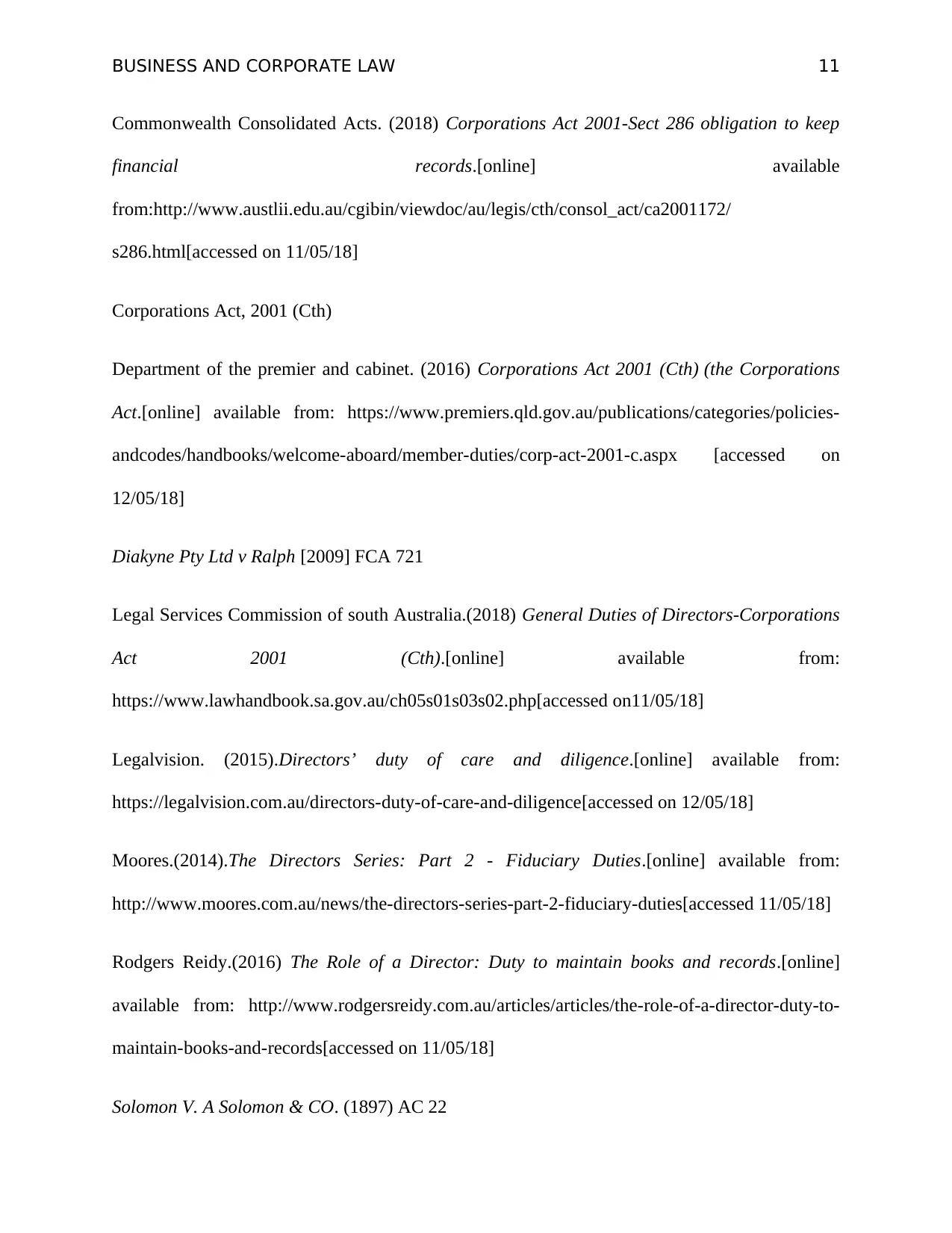
BUSINESS AND CORPORATE LAW 11
Commonwealth Consolidated Acts. (2018) Corporations Act 2001-Sect 286 obligation to keep
financial records.[online] available
from:http://www.austlii.edu.au/cgibin/viewdoc/au/legis/cth/consol_act/ca2001172/
s286.html[accessed on 11/05/18]
Corporations Act, 2001 (Cth)
Department of the premier and cabinet. (2016) Corporations Act 2001 (Cth) (the Corporations
Act.[online] available from: https://www.premiers.qld.gov.au/publications/categories/policies-
andcodes/handbooks/welcome-aboard/member-duties/corp-act-2001-c.aspx [accessed on
12/05/18]
Diakyne Pty Ltd v Ralph [2009] FCA 721
Legal Services Commission of south Australia.(2018) General Duties of Directors-Corporations
Act 2001 (Cth).[online] available from:
https://www.lawhandbook.sa.gov.au/ch05s01s03s02.php[accessed on11/05/18]
Legalvision. (2015).Directors’ duty of care and diligence.[online] available from:
https://legalvision.com.au/directors-duty-of-care-and-diligence[accessed on 12/05/18]
Moores.(2014).The Directors Series: Part 2 - Fiduciary Duties.[online] available from:
http://www.moores.com.au/news/the-directors-series-part-2-fiduciary-duties[accessed 11/05/18]
Rodgers Reidy.(2016) The Role of a Director: Duty to maintain books and records.[online]
available from: http://www.rodgersreidy.com.au/articles/articles/the-role-of-a-director-duty-to-
maintain-books-and-records[accessed on 11/05/18]
Solomon V. A Solomon & CO. (1897) AC 22
Commonwealth Consolidated Acts. (2018) Corporations Act 2001-Sect 286 obligation to keep
financial records.[online] available
from:http://www.austlii.edu.au/cgibin/viewdoc/au/legis/cth/consol_act/ca2001172/
s286.html[accessed on 11/05/18]
Corporations Act, 2001 (Cth)
Department of the premier and cabinet. (2016) Corporations Act 2001 (Cth) (the Corporations
Act.[online] available from: https://www.premiers.qld.gov.au/publications/categories/policies-
andcodes/handbooks/welcome-aboard/member-duties/corp-act-2001-c.aspx [accessed on
12/05/18]
Diakyne Pty Ltd v Ralph [2009] FCA 721
Legal Services Commission of south Australia.(2018) General Duties of Directors-Corporations
Act 2001 (Cth).[online] available from:
https://www.lawhandbook.sa.gov.au/ch05s01s03s02.php[accessed on11/05/18]
Legalvision. (2015).Directors’ duty of care and diligence.[online] available from:
https://legalvision.com.au/directors-duty-of-care-and-diligence[accessed on 12/05/18]
Moores.(2014).The Directors Series: Part 2 - Fiduciary Duties.[online] available from:
http://www.moores.com.au/news/the-directors-series-part-2-fiduciary-duties[accessed 11/05/18]
Rodgers Reidy.(2016) The Role of a Director: Duty to maintain books and records.[online]
available from: http://www.rodgersreidy.com.au/articles/articles/the-role-of-a-director-duty-to-
maintain-books-and-records[accessed on 11/05/18]
Solomon V. A Solomon & CO. (1897) AC 22
⊘ This is a preview!⊘
Do you want full access?
Subscribe today to unlock all pages.

Trusted by 1+ million students worldwide
1 out of 13
Related Documents
Your All-in-One AI-Powered Toolkit for Academic Success.
+13062052269
info@desklib.com
Available 24*7 on WhatsApp / Email
![[object Object]](/_next/static/media/star-bottom.7253800d.svg)
Unlock your academic potential
Copyright © 2020–2026 A2Z Services. All Rights Reserved. Developed and managed by ZUCOL.

![Fodare Pty Ltd v Shearn [2011] NSWSC 479: Director Duties Case Study](/_next/image/?url=https%3A%2F%2Fdesklib.com%2Fmedia%2Fimages%2Fbz%2Fe5781427ac544a2fa81db59f3d03f924.jpg&w=256&q=75)
![Fodare Pty Ltd v Shearn [2011] NSWSC 479: Director Duty Case Analysis](/_next/image/?url=https%3A%2F%2Fdesklib.com%2Fmedia%2Fimages%2Fmf%2Fb24438803f71439b897a53a3204582ca.jpg&w=256&q=75)

![Analysis of Fodare Pyt Ltd. V Shearn [2011] NSWSC 479 Case](/_next/image/?url=https%3A%2F%2Fdesklib.com%2Fmedia%2Fimages%2Fto%2Fc003c47972d54ac499b6fca5329d3bb6.jpg&w=256&q=75)